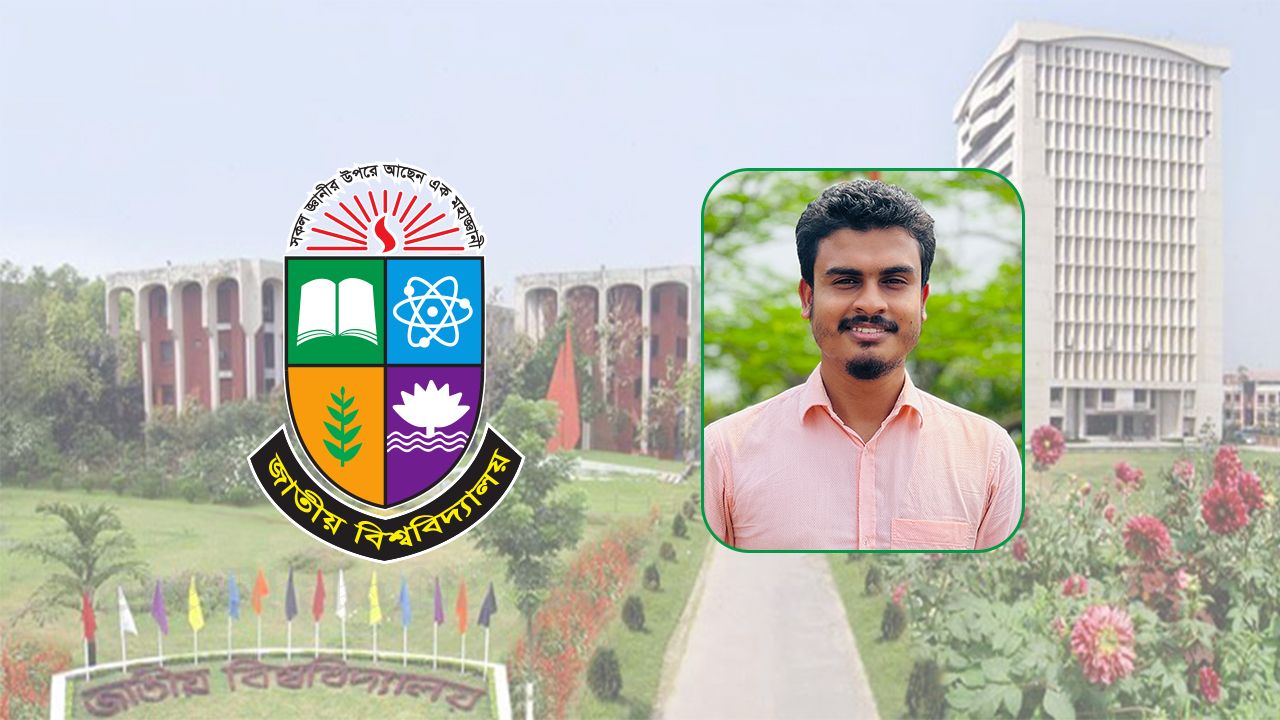.png)
.png)
By Tanjid Shuvro
Student, Department of Botany, Bhawal Badre Alam Government College, Gazipur
National University (NU) stands as the largest seat of higher education in Bangladesh—its reach spreads across the map of the entire nation. More than 3.5 million students are currently pursuing their studies under its umbrella, across 2,257 affiliated colleges, playing a vital role in ensuring higher education for nearly 70 percent of the country’s students.
Established on October 21, 1992, at Board Bazar in Gazipur, the university carries the emotions, hopes, and pride of countless students across the country. It offers four-year undergraduate (honours), three-year pass courses, professional honours programs, and one-year postgraduate degrees, along with opportunities for MPhil and PhD research.
The National University was founded with the vision of making higher education accessible to the masses, and it has lived up to that commitment. Yet, despite being the largest university by enrollment, it continues to face systemic neglect and underappreciation. Students have long voiced frustrations over issues like exam paper evaluation delays, insufficient classes, lack of practical sessions, poor attendance, unorganized in-course assessments, and the absence of convocations. Even after three decades of establishment, many of these problems remain unresolved.
In recent times, NU has made commendable progress in certain areas. The university has worked to overcome server complications in result publication, and has emphasized 75% class attendance for students across affiliated colleges. During the COVID-19 pandemic, NU introduced online classes, turning recorded lectures into valuable digital resources. It has also launched an e-library, giving students and teachers nationwide access to important books and academic journals. Official email IDs have been assigned to all students, teachers, and staff under the university domain, and ICT courses have been added to the curriculum to meet modern demands.
However, the lack of classroom engagement still plagues many colleges. Some even perceive NU as a last resort for those who wish to avoid regular classes—a perception both unfair and damaging. A shortage of teachers, inadequate facilities, and weak practical instruction undermine the goal of producing skilled graduates. In an age of global competition, theoretical knowledge alone cannot build competent human resources. Therefore, the university must ensure adequate practical training, fieldwork supervision, and real-world learning opportunities beyond mere report submission.
The disparity in higher education expenditure also reveals deep inequality. According to 2022 data, while some universities spend hundreds of thousands of taka per student annually, the expenditure at National University remains below Tk 1,000 per student—nearly a hundredfold difference. This gap not only reflects financial inequality but also highlights disparities in educational quality and opportunity. Increasing the budget and ensuring educational excellence are now matters of urgency.
Many still view this autonomous institution through a lens of condescension, causing even its own students to feel inferior about their affiliation. Most students and teachers remain unaware of NU Day on October 21, which should have been a source of pride. Ironically, National University’s students themselves often underestimate the value of their own institution more than outsiders do.
Although the university is affiliated with the University Grants Commission (UGC) like other public universities, it is often unfairly separated in discussions and ceremonies. Yet, NU maintains one of the most transparent examination systems in the country—students sit for their exams at different colleges, much like a board examination, with attendance tracked via digital scanning linked directly to NU servers.
Admission procedures, too, have evolved. After years of GPA-based enrollment, NU has reinstated entrance exams this year for honours first-year students, adding more academic rigour. Nonetheless, the stereotype persists that NU students are “less meritorious,” an attitude that must change if merit is to be judged fairly and inclusively.
For any student, convocation marks one of the most cherished milestones in university life—the black gown, the hood, and the symbolic cap tossed into the air represent years of dedication and achievement. But for National University graduates, this moment remains largely a distant dream.
The university held its first convocation on January 17, 2017, in Dhaka. A second one was planned for 2020 but was canceled due to the COVID-19 pandemic. Years have since passed, yet no final decision has been made regarding the next convocation. The current vice-chancellor has assured students of its arrangement in response to their long-standing demand, but the promise remains pending.
Let National University be freed from the shackles of neglect and undervaluation. Let its glory spread across the country like that of other universities. May the institution fulfill its founding purpose—to build skilled, enlightened citizens for the nation’s future.
.png)
শনিবার, ২৮ ফেব্রুয়ারি ২০২৬
Published : ২১ অক্টোবর ২০২৫

.png)
Stay connected with The Dhaka News